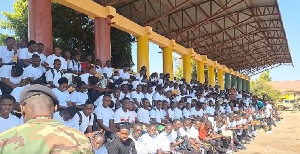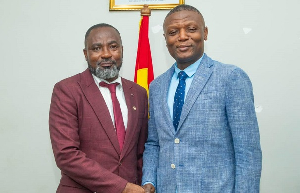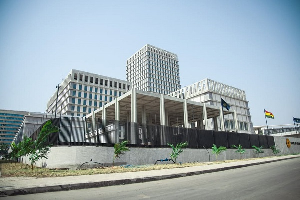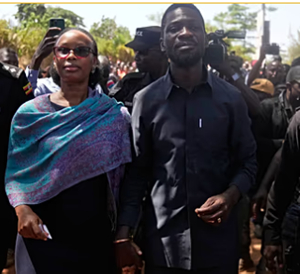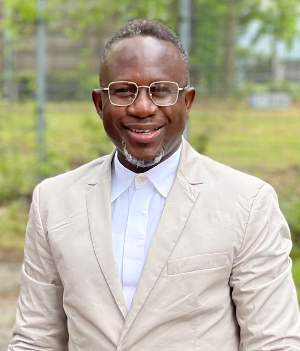Repeat, it is imperative that all critically-minded Ghanaians move beyond coup-plotter narratives. Without doubt, Gbedemah contributed to the initial successes of Nkrumah's CPP. However, we must examine actual records related to the CPP government under Kwame Nkrumah, all the way to the end. And, whatever you find during your search, humbly consider the idea that negatives are never a reflection on any group of people.
Rather, they are a poor and sad reflection on the individuals at the center of the stories they created, managed, massaged for their own selfish purposes, and those others they used to achieve those purposes.
For instance, as the record in the essay below shows, even the imprisonment of Gbedemah was staged by the British for their own purpose. In a Daily Graphic feature (Issue 547, August 9 1952), most likely directed by Gbedemah (and/or the British), they make sure to project Gbedemah as natural leader after Nkrumah. And so, under the "Prison Graduate No. 1" caption, they made sure to teach that "...To many Africans and Europeans, Gbedemah symbolizes all that is best in the CPP...".
However, oddly, they ignored the fact Gbedemah in fact owned one of the biggest poultry farms in Ghana. All this, in the heat of the struggle for Ghana's independence. Near the time Gbedemah was appointed Finance Minister, he sold his businesses and secretly invested the proceeds in a bank in Geneva).
Continuing from Part 1, .....
"THE TRUTH ABOUT KOMLA GBEDEMAH BY A NON-GHANAIAN INTELLECTUAL", 1964.......
READ:
"" THE PRISON GRADUATE "":
"The British are good experts at planting their agents' in the governments of other countries. Placing their stakes on Gbedemah they decided to create a false nationalistic nimbus around him. With that aim in view, they put him in prison in 1949 for ""trying to instigate a rebellion"".
We do not know the contents of the conversations held by the representatives of the British authorities with Gbedemah in prison.
What is known for certain is that very soon Gbedemah was set free. On the day of his release from prison the headquarters of the Convention People's Party was raided by the police while Nkrumah and other leaders of the Party were arrested. Since that time Gbedemah calls himself a ""prison graduate"". In Nkrumah's absence, he became leader of the Convention People's Party, head of its printed organ-the Accra Evening News, and carried out preparations for municipal elections.
It was very strange that in those stormy and dangerous times everything went on so smoothly with Gbedemah. It was literally before the very eyes of the British authori-ties that Gbedemah carried on his work for which other people would have paid with their lives while he, Gbedemah, remained unscathed. He even managed to organise regular correspondence with Nkrumah who was then languishing in prison and who thought at the time that only he and Gbede-mah were in on it.
THE BRITISH COUNTED ON A VERY SIMPLE THING:
They wanted to remove Nkrumah in whom they saw a dangerous enemy who did not wish to come to any compromise and create the seeming of independence in the form of a self-governing colony under the supervision of a governor. In this farce the ""prison graduate"" was assigned the post of premier of the ephemeral Gold. Coast Government. The intelligence service supported this plan and gave him a loyalty certificate. The British authorities did not interfere with Gbede-mah's activities and were by no means abashed when the Convention People's Party won at the municipal elections in 1950. They thought that everything was under control and that nothing unexpected could ever happen.
BUSINESS AGAIN:
The people of the Gold Coast have passed their own judgement, however. The people demanded that Nkrumah be set free. Unrest spread through- out the entire country. It was in Nkrumah, and not in Gbedemah, that they saw their leader and the triumph at the elections gave them new strength in their struggle for the liberation of the leader of the victorious party. Having no wish to make a martyr of Nkrumah, the British thought it best to set him free and even reconcile themselves to his appoint-ment to the Cabinet as the chief spokesman for government affairs. Gbedemah had no other choice, but to be satisfied with a seat in the Legislative Assembly and the post of Minister of Health and Labour.
In 1952 when Nkrumah succeeded in securing British consent to introduce the post of Prime Minister instead of the vague title of the chief spokesman for government affairs, Gbedemah became Minister of Trade and Industry and follow- ing the 1954 elections, received the portfolio of Minister of Finance.
It should be mentioned here that since the time of Nkrumah's release from prison, Gbedemah's promotion was hampered. He did not succeed in becoming either the first man among the nationalists of the Gold Coast or even Nkrumah's closest associate.
In the following years Gbedemah always occupied ministerial posts, but he never played the role of the second man in the Republic, except during a very short period in the summer of 1961, when Nkrumah and his closest followers made their trip abroad.
The British still persisted in supporting Gbedemah's ambitious plans and mercenary schemes. But eventually they no longer pinned their main hopes on him in their struggle against Nkrumah. London was more impressed by the leader of the opposition Dr. Busia who seemed to the British more significant a figure than "" the prison graduate "".
Gbedemah was afraid that he would lose political weight and would be reduced to an ordinary, though well-versed, informant.
Incidentally, as a Minister of Trade and Finance he was in a position to do much more. And indeed he did everything the British authorities asked him to. He did his best, of course, under all kinds of pretexts to prevent the Africanization of the state apparatus and arranged deals profitable for foreign businessmen but ruinous to the Gold Coast. He did not forget his own business and deposited large sums of money in his accounts whenever trans-actions were profitable.
Just one "" operation "" of buying 24 locomotives from the Swiss businessman Johann Bernard Litscher brought him 10,000 Ghanaian pounds transferred to his account by the Henschel Firm in one of the Swiss banks. And yet the future worried Gbedemah. He did not share Nkrumah's socialist ideas although he had some vague notion about sociology and particularly socialism. But being a businessman by nature he believed in capitalism, in a society based on private initiative. While clearing his way for attaining the ministerial post in Accra he thought that his qualities of an adroit businessman and his connections in the British business circles would prove useful to him in the future capitalist Ghana.
He saw very quickly, however, that Nkrumah tried to create welfare for all and not just for a handful of the government elite. He understood then that their roads diverge. By 1957, when Ghana declared its independence, he lost all hope of find- ing any political contacts with Nkrumah and noticing a lack of interest on the part of the British in himself began to think of additional sources of increasing his personal wealth.
In 1957 Gbedemah established his own private business in Ghana-a poultry farm at which he employed over 50 Ghanaian labourers. The farm brought annually 5 million eggs and 300 tons of fresh-frozen chicken meat. The Finance Minister obtained over 40,000 Ghanaian pounds a year by selling eggs alone. Gbedemah became partner in the Mallam Issa Transport Company and a number of smaller enterprises. Using his ministerial post, he became the initiator and participant of puzzling financial machinations, both in Ghana and abroad. Notwithstanding considerable profits Gbedemah received through his business, his thirst for money was not fully satisfied.
THE NEW PATRON:
In 1958 Gbedemah went to the U.S. where he negotiated with the American Government on some aspects of technical assistance to Ghana and a loan for the Volta River Project. It should be pointed out that by that time the Americans took very great interest in the young Republic and Gbedemah's arrival, whose leanings towards the West were well known, proved quite an asset for Washington.
Negotiations ended successfully, not for Ghana naturally, but for the U.S. and Gbedemah. The latter understood that apart from the British, there were other generous supporters with their hand-outs. Besides, certain conditions of carrying through the Volta project spelled very great opportunities for Gbedemah's personal enrich- ment. American businessmen, in turn, were very pleased with Gbedemah.
Ghana's Finance Minister demonstrated a rare understanding of their interests, and agreed to defend in the Cabinet a number of terms favourable for American business circles, such as the joint construction project of an aluminum plant in the vicinity of the Volta river with subsequent transfer of the controlling interest to the Americans, granting the "" Star Kissed "" Co. a monopoly on catching the tuna-fish in Ghana's territorial waters, the use of the local, in other words, cheap labour, etc. In general, the Ghanaian Minister proved quite a tractable man who agreed to meet in Accra with Allan Dulles's agent as a confirmation of his loyalty to the U.S.
Great was the astonishment of Gbedemah when several days after his return from the U.S. his personal assistant, Victor de Grand Brempong, entered his study and gave him the first instructions on behalf of his overseas boss. Under these instruc- tions Gbedemah was to compromise Nkrumah and ensure conditions for his overthrow..........//....".
.........//....".
To be continued.....
VISIT WWW.GHANAHERO.COM/VISIONS, FOR MO' INFORMATION: FOIB - Freedom of Information Bill (FOIB/FOI/Ghana), Ask for it! (http://ghanahero.com/FOIB.html).
SUBJ: Greedy Komla Agbdli Gbedemah and his rascal side-kick Kofi Abrefa Busia!, Part 2, re-post of "THE TRUTH ABOUT KOMLA GBEDEMAH BY A NON-GHANAIAN INTELLECTUAL", 1964, with commentary by Prof Lungu.
Support Fair-Trade Oil Share Ghana (FTOS-Gh) Campaign/Petition: https://www.change.org/p/ghana-fair-trade-oil-share-psa-campaign-ftos-gh-psa/ .
Brought to you courtesy www.GhanaHero.com©24 Jan 17.
(Powered by: www.GhanaHero.Com).
Opinions of Thursday, 26 January 2017
Columnist: Lungu, Prof.



